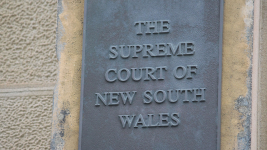NSW Bail Applications: Supreme Court Decisions on Section 22B of the Bail Act 2013

On Tuesday, 21 June 2022, the Bail Amendment Act No 27 was introduced into the New South Wales Parliament and passed by both Houses just two days later – with virtually no community consultation.
The Act introduced a new section 22B into the Bail Act 2013, which essentially makes it harder to make a successful ‘release application’ – commonly known as a bail application – and easier for the prosecution to make a successful detention application – in other words, to have existing bail revoked – in circumstances where a defendant pleads guilty to, or is found guilty of, a criminal offence and the case is adjourned to another date for a sentencing hearing.
Section 22B Bail Act 2013
The new section provides as follows:
22B Limitation regarding bail during period following conviction and before sentencing for certain offences
(1) During the period following conviction and before sentencing for an offence for which the accused person will be sentenced to imprisonment to be served by full-time detention, a court—
(a) on a release application made by the accused person—must not grant bail or dispense with bail, unless it is established that special or exceptional circumstances exist that justify the decision, or
(b) on a detention application made in relation to the accused person—must refuse bail, unless it is established that special or exceptional circumstances exist that justify the decision.
(2) If the offence is a show cause offence, the requirement that the accused person establish that special or exceptional circumstances exist that justify a decision to grant bail or dispense with bail applies instead of the requirement that the accused person show cause why the accused person’s detention is not justified.
(3) Subject to subsection (1), Division 2 applies to a bail decision made by a court under this section.
(4) This section applies despite anything to the contrary in this Act. (5) In this section— conviction also includes a plea of guilty.
Note— Conviction is defined in section 4(1) to include a finding of guilt.
Previous articles
We have written several articles about the new section, which outline its provisions and discuss its practical effect, its likely impact on defendants and the implications for the criminal justice system.
These articles include:
- Lawyers Slam Further Tightening of NSW Bail Laws, 27 June 2022,
- The New Bail Act Amendments: Against the Interests of Justice and the Community, 28 June 2022, and
- New Bail Law Requiring Detention Upon Guilty Plea is Impossible to Apply, 25 July 2022.
Case law
This article seeks to summarise four cases heard by the Supreme Court of New South Wales – two of which were appealed to the New South Wales Court of Criminal Appeal (NSWCCA) – that make important findings about the operation of the controversial section.
These cases are:
This case was heard at first instance before a single Supreme Court Justice, after which it was appealed to the NSWCCA.
Facts
- The defendant was charged with 50 counts of embezzlement under section 157 of the Crimes Act 1900.
- He was granted conditional bail.
- He pleaded not guilty to all counts and the matter proceeded to a District Court jury trial.
- The jury returned verdicts of guilty on 34 counts.
- The prosecution made a detention application after the jury’s verdict.
- The presiding judge refused the detention application, continuing the defendant’s bail with variations.
- The prosecution then made a further detention application, this time in the Supreme Court, relying on the provisions of section 22B.
Primary issue
The main issue before the Supreme Court was whether the prosecution had established that the defendant “will be sentenced to imprisonment to be served by full-time custody”, thereby triggering the operation of section 22B.
Findings
The Supreme Court found that the determination of an appropriate sentence will depend on various findings of fact, and that these findings may not arise until the sentence hearing.
The court noted that the determination of an appropriate penalty occurs through an ‘instinctive synthesis’ undertaken by the sentencing judge.
That being the case:
- A judge hearing a release or detention application after conviction and before pronouncement of sentence, including before a sentence hearing, cannot be understood to be engaged in the process of sentencing, but an entirely different decision-making process, namely the making of a bail decision;
- It follows that in making a bail decision, a judge who will preside over a sentencing hearing and then pronounce sentence, cannot be taken to be pre-judging the sentence which is to be imposed. If any part of the bail decision constitutes a pre-judgment of the sentence to be imposed, then there is a significant risk that the judge who presided over a trial and who is best placed to receive and deal with submissions about sentence, is at risk of being disqualified from undertaking that part of the criminal trial process by reason of pre-judgment. This would not benefit the administration of justice; and
- The bail decision-making process should avoid embracing an approach which is in any way contrary to, or inconsistent with, the instinctive synthesis approach to sentencing. Put differently, in undertaking a bail decision, it is not open to the judge to apply a “one-tier” approach – namely, to consider and determine whether a sentence of imprisonment will be imposed based only on an assessment of the objective facts and circumstances and the objective seriousness of the offence.
The court further found that the term ‘decision’ in section 22B must be interpreted as meaning ‘the contrary decision’ or ‘a decision to dismiss the detention application’.
Other findings of the court were that:
- The onus of persuading the court to that satisfaction in a detention application falls on the prosecution, which must satisfy the court the balance of probabilities that no sentencing alternative could other than full-time imprisonment could be imposed.
- Where the prosecution engages in that task by relying on inferences and conclusions from convictions for the offences charged, and no other objective or subjective matters, it will be very difficult for the prosecution to persuade a court that all sentencing options other than full-time imprisonment will be excluded.
- If there is any doubt about this, or where the court is unpersuaded that there is no option other than full-time imprisonment, the provisions of section 22B will not cause a detention application to succeed.
- The prosecution establishing on the balance of probabilities that there is a high likelihood of a sentence of full-time imprisonment is not sufficient to satisfy the requirements of section 22B because this does not amount to a finding that the defendant “will” be sent to prison.
Decision
The court was not satisfied that the prosecution had discharged its onus of establishing that the defendant “will” be sentenced to imprisonment.
Orders
The detention application was unsuccessful and bail was continued.
Appeal filed
The DPP appealed the decision to the NSWCCA.
On appeal
Director of Public Prosecutions (NSW) v Day [2022] NSWCCA 173 (15 August 2022)
The main issue before the court was once again whether the defendant “will” be sentenced to full-time imprisonment.
Findings
The appeal court made the following findings:
- The decision as to whether the defendant “will” be sent to prison is an evaluative judgment of a future matter and proof on the balance of probabilities is not the applicable standard.
- The word ‘will’ can be interpreted as ‘what is realistically inevitable as distinct from what may happen or is likely to happen’. It does not mean a state of absolute certainty.
The court further found that in assessing whether a defendant will be sent to prison, the following should be considered:
(1) the offence(s) for which the accused person has been convicted, bearing in mind the principles of sentencing and all applicable sentencing laws, specifically the Crimes (Sentencing Procedure) Act 1999 (NSW), including the available sentencing alternatives to full-time imprisonment;
(2) the materials and submissions placed before the Court as the bail authority relevant to the future disposition of the sentence with respect to the convicted person; and
(3) the abbreviated nature of the release or detention application before the Court, especially, that the application is not a pseudo or abridged sentencing hearing.
It further found that the fact that an alternative sentence to full-time imprisonment is lawfully, and therefore theoretically, available does not mean that the court is prohibited from finding that the defendant “will” be sent to prison.
In that regard, the appeal court found that:
- Notwithstanding the theoretical availability of an alternative sentence to full-time imprisonment, the Court as the bail authority could reach the degree of satisfaction required by the condition in s 22B(1) if it is satisfied on the materials and submissions placed before the Court, that no other sentence than full-time imprisonment could realistically be imposed by the sentencing court with respect to the convicted person in all the circumstances of the case, and
- In making a bail determination, the court should not conduct an ‘abridged sentencing hearing’.
Decision
- The court was not satisfied that the respondent will be sentenced to imprisonment to be served by full-time detention, and
- The requirement to refuse bail under section 22B was therefore not engaged.
Orders
The prosecution’s detention application was dismissed and the defendant remained at liberty.
This case was heard at first instance before a single Supreme Court Justice, after which it was appealed to the NSWCCA.
Facts
- The defendant was charged with several counts of indecent assault against children.
- He was subsequently granted bail.
- He was convicted by a jury on all counts.
- The judge continued bail without objection from the prosecution until the sentence hearing.
- The DPP then made a detention application the Supreme Court under s 50 Bail Act, relying on section 22B.
Primary issues
- Whether section 22B applies retrospectively.
- Whether requirement that the defendant ‘will be sentenced to imprisonment to be served by full-time detention’ is satisfied.
- If so, whether special or exceptional circumstances exist, so as to overcome the requirement to grant the detention application.
Findings
- Retrospective application
The court found that section 22B does not offend any common law presumption against retrospectivity because:
“… s 22B takes into account antecedent facts, namely the fact that a person has been convicted but not sentenced, and uses that as a basis for what it prescribes is to occur in the future, namely that the person is not to be released if he or she will be sentenced to full-time imprisonment, and if there are no special or exceptional circumstances.”
- Full-time imprisonment
The court agreed with the finding in Day at first instance that the prosecution must exclude the possibility of sentencing options other than full-time custody.
It found that an intensive correction order could be lawfully imposed in the circumstances.
The prosecution had therefore failed to discharge its onus of proving, on the balance of probabilities, that the defendant “will” be sentenced to full-time imprisonment.
- Special or exceptional circumstances
The court found if it is found that a defendant “will” be sentenced to full-time imprisonment, it must not dismiss a detention application unless special or exceptional circumstances exist.
As to the meaning of special or exceptional circumstances, the court found that:
“… ‘Special or exceptional circumstances’ may exist in the combination of factors or in the ‘coincidence of a number of features’: cf the comments of Johnson J in R v Young [2006] NSWSC 1499 at [20], when dealing with the requirement to establish ‘exceptional circumstances’ in a murder case under the 1978 Act. It is not possible to determine or predict in advance what those features may be. …” (El–Hilli and Melville v R [2015] NSWCCA 146.)
The court further found that
- The need for the defendant to attend an existing appointment in the near future and to undergo testing for the purpose of establishing state of health is a special circumstance, as is the need to assist his wife with her ongoing health conditions.
That found, the court proceeded to consider the generic unacceptable risk test; in other words, to determine whether any risks of granting bail to the defendant could be overcome by bail conditions.
Decision
The court found that the defendant was not a person to whom the provisions of section 22B applied, as sentencing options other than full-time imprisonment were available.
The court further found that:
- Special or exceptional circumstances existed, and
- There were no unacceptable risks which would warrant the granting of a detention application.
Orders
The prosecution’s detention application was dismissed and the defendant remained at liberty.
Appeal filed
The DPP appealed the decision to the NSWCCA.
On appeal
Director of Public Prosecutions (NSW) v Van Gestel [2022] NSWCCA 171 (12 August 2022)
The primary issues were, once again, whether the requirement that the defendant “will” be sentenced to full-time imprisonment was satisfied and, if so, whether special or exceptional circumstances were established so as to defeat the detention application.
Findings:
- Will be sentenced to full-time imprisonment
The appeal court found that the word “will” calls for an opinion or state of satisfaction (not fact).
It further found that as this is an evaluative judgment, the relevant standard is not one of balance of probabilities, and that:
- The availability of a sentencing option does not meet the required state of satisfaction.
- The court is not required to conduct a pseudo/abridged sentencing hearing.
- The term ‘will’ suggests what is realistically inevitable, rather than what may or is likely to happen, and
- That in making the assessment, the court will consider:
(1) the offence(s) for which the accused person has been convicted, bearing in mind the principles of sentencing and all applicable sentencing laws, specifically the Sentencing Procedure Act, including the available sentencing alternatives to full-time imprisonment;
(2) the materials and submissions placed before the Court as the bail authority relevant to the future disposition of the sentence with respect to the convicted person; and
(3) the abbreviated nature of the release or detention application before the Court, especially, that the application is not a pseudo or abridged sentencing hearing.
- Special or exceptional circumstances
The court noted that the terms ‘special’ and ‘exceptional’ are already contained in the Bail Act, finding that existing case law relating to these terms is therefore applicable in the context of section 22B.
It found that the approach of the court has been not to set out an exhaustive list of factors that may constitute ‘special or exceptional circumstances’. Rather, they ‘may exist in the combination of factors or in “the coincidence of a number of features”. It is not possible to determine or predict in advance what those features may be’ (El Hilli and Melville v R)
The court noted that in the case at hand, the defendant (or bail respondent) relied on three matters as amounting to special or exceptional circumstances, namely:
(1) the respondent has significant health issues that require further and investigation and treatment within the community;
(2) the respondent needs to be at liberty to be able to attend the appointments in the community to be able to obtain necessary information as to his health to put forward on his sentence;
(3) the respondent has a need to make further arrangements for the care of his wife and his son should he go into custody.
Decision
The court decided that none of the above three factors, whether by themselves or combined, amounted to special or exceptional circumstances.
Orders
The prosecution’s detention application was granted and the defendant was remanded in custody pending the sentencing proceedings.
3. Director of Public Prosecutions (NSW) v Duncan [2022] NSWSC 927
Facts
- A jury convicted the defendant respondent of sexual offences and the judge continued bail until the sentencing hearing.
- Section 22B was enacted in the intervening period.
- The prosecution then made a detention application pursuant to the provisions of section 22B.
Primary issues
- Whether section 22B applied retrospectively.
- Whether the prosecution had established that the defendant “will” be sentenced to a period of full-time custody.
- Whether there were special or exceptional circumstances.
Findings
- Retrospective application
The court found that section 22B takes account of antecedent facts and circumstances as a basis for what it prescribes for the future (Robertson). As it does not go beyond this, it is not ‘retrospective’. Hence, it may apply to persons convicted on or after its commencement date.
2. ‘Will’ be sentenced to full-time imprisonment
The court found that the onus rests on the prosecution to prove this the balance of probabilities.
The court found that, in this case, the defendant would be sentenced to full-time imprisonment.
3. Special or exceptional circumstances
The prosecution accepted that the defendant’s health issues were ‘special or exceptional’, and the court was therefore not required to make a determination in that regard.
Decision
Special or exceptional circumstances were present so as to overcome the requirement to detain the defendant.
Orders
The prosecution’s detention application was dismissed and the defendant was permitted to remain at liberty on bail.
Facts
- The defendant was a young person who made a bail application after pleading guilty to a charge of affray under section 93C of the Crimes Act 1900.
- The matter was adjourned for sentence.
Primary issue
The question before the court was whether special or exceptional circumstances existed.
Findings
Citing the case of El–Hilli and Melville v R, the court found that where it is possible that, in the event bail is refused, the defendant could be in custody for as long as any likely prison sentence could by itself constitute special or exceptional circumstances.
Decision
The court decided that the it was indeed possible that, if remanded in custody, that could indeed be as long as the the defendant’s ultimate prison sentence, and that a special or exceptional circumstance exists on that basis.
Order
The defendant’s bail was continued.
Need a Lawyer for a Bail Application in NSW?
If your loved-one has been arrested by police and requires representation in court by an experienced criminal defence lawyer with an exceptional track record in making successful bail applications in difficult circumstances, call Sydney Criminal Lawyers anytime on (02) 9261 8881 and have our award-winning criminal defence team fight for his or her liberty.






